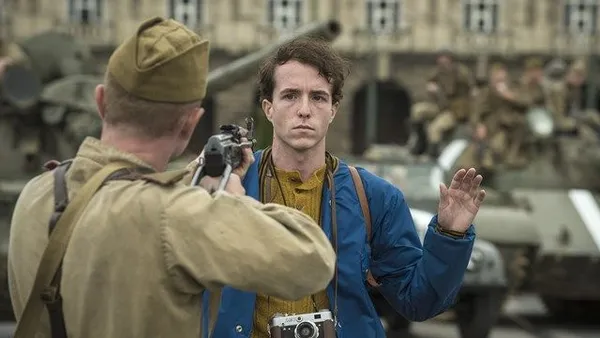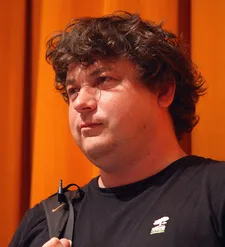 |
| Robert Sedláček on Jan Palach: 'Palach is a national treasure, the source of many strong opinions. It is important we keep his memory alive. Yet we know very little about him' |
 |
| Robert Sedláček Photo: Petr Novák, Wikipedia |
Sedlácek comes to directing from journalism. He crossed over to filmmaking with Rules Of Lies, a 2006 film about drug addiction. His reputation grew with Long Live The Family (2011) and he is also acclaimed for The Czech Century (2013).
Despite this, he is renowned as a “bad boy” of Czech culture...getting up close to Milos Zeman, a Czech president well-known for his antipathy toward journalists, and then turning up to receive one of his country's highest honours from the same president wearing a knitted sweatshirt.
For such reasons, he may seem an odd choice to make the first official film of Czech (and Slovak) national hero Jan Palach: but perhaps the opposite is the case. To make a film about an awkward individual who did not fit, who better than a director with some of those same characteristics?
Who better, too, than a director whose instincts lie on the side of documentary? For as Sedlácek explained: “Palach is a national treasure, the source of many strong opinions. It is important we keep his memory alive. Yet we know very little about him.
“So much of what happened to Palach was internal and therefore died with him. And what we do know, from those closest to him is that he was a loner, keeping his thoughts very much to himself. At the same time, he projected a myriad different faces to each of those whose lives he touched”.
Perhaps the person who knew him best of all was his brother: though even he, seven years older and distant in age, does not seem to have known Jan well. For him, Sedlácek recalls, Jan was far from a hero. But then there were consequences after Palach killed himself, above all for his family. “Was it worth it?”, his brother still asks. Well, was it?
“None of those making films today have direct experience of Palach, yet we have correspondence, journals, some footage, eye witness accounts.”
Ironically, Sedlácek reveals, a great deal of material surfaced with the opening of the archives of State Security (StB), a plain clothes secret police arm, when Czechoslovakia shook off its communist government in 1990.
Because even – or perhaps especially – dead, Palach became a symbol of defiance and an emblem of national self-confidence. So the ŠtB waged war on his memory, on his family, on anyone who knew him. Their campaign was medieval in its ferocity: after he was buried, in Prague, they had his remains dug up transported far from the capital, and burnt.
As if they understood the risk that a modern martyrdom could gather to itself the trappings of medieval sainthood.
This, it seems, is part what lies behind the way in which Sedlácek approached his subject. Time and again, in interview, he returns to themes that are quasi-religious. Palach, he suggests, was “like a Czech Jesus”, a “saint for the Czech Republic”.
And that in turn informs both his selection as director and his approach. A director more used to seeking out the dramatic narrative and rounding off his films with meaning might have been tempted to shape Palach's character more overtly, to provide motives where none are known. And while this might have made for a more “interesting” film, it would have run quite counter to the task in hand, which was to tell the life of a significant historic figure. Would, too, have meant taking sides, which would have been self-defeating.
In this, Sedlácek's treatment of Palach reflects similar treatments given to other similar icons - holy figures who pass through their own story, but in the end, not entirely knowable to any but themselves. Or rather, by their deeds you shall know them. That is all.
This was an important story to tell, a significant one that, in time, is likely to impact a nation's self-image in a way few films ever can. In this, Sedlácek finds himself stepping in the shoes of other directors, such as Eisenstein, who have played a similarly pivotal role in their country's development.
Though he makes no such comparison, he understands the honour he has been given.





















